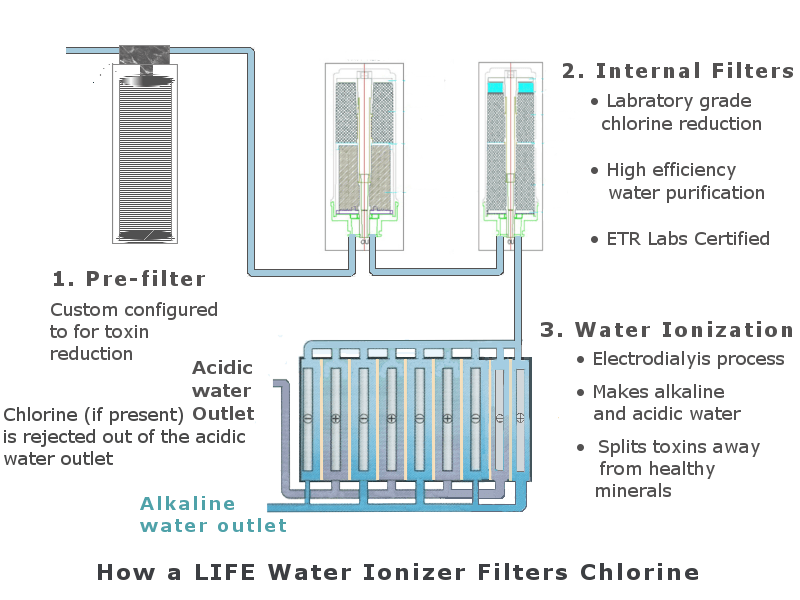Disclaimer: There are affiliate links in this post. At no cost to you, I get commissions for purchases made through links in this post.
An alkaline water filter is a type of water filtration system that uses a process called ionization to increase the pH level of water, making it more alkaline. These filters typically use a combination of activated carbon and ion exchange resin to remove impurities from the water, while adding beneficial minerals such as calcium, magnesium, and potassium.
The process of ionization involves passing the water through a series of charged plates that separate the water into acidic and alkaline streams. The alkaline water is then collected and made available for consumption.
Advocates of alkaline water claim that it has a number of health benefits, including improved digestion, increased energy, and better hydration. However, scientific studies have not conclusively demonstrated these benefits, and some experts caution that excessive consumption of alkaline water could lead to imbalances in the body’s natural pH levels.
Overall, alkaline water filters can be a useful tool for those looking to improve the quality of their drinking water. However, it is important to approach these filters with a critical eye and to consult with a healthcare professional before making any significant changes to your diet or hydration routine.
Do alkaline water filters really work?
Alkaline water filters can be effective at raising the pH level of water, which can make it more alkaline. However, the effectiveness of these filters can vary depending on the quality of the water source and the specific filter being used.
In terms of removing impurities, alkaline water filters typically use a combination of activated carbon and ion exchange resin to filter out contaminants such as chlorine, sediment, and heavy metals. The effectiveness of these filters can vary depending on the quality of the water source and the specific filter being used.
There is some debate among health experts as to whether alkaline water offers significant health benefits. While some studies have suggested that alkaline water may have antioxidant and anti-inflammatory properties, the evidence is not yet conclusive.
Overall, if you are interested in using an alkaline water filter, it is important to do your research and choose a reputable brand with a proven track record of effective filtration. It is also important to consult with a healthcare professional before making any significant changes to your diet or hydration routine.
Which filter is best for alkaline water?
There are many different types of filters that can be used to make alkaline water, and the best one for you will depend on your specific needs and preferences. Here are a few types of filters that are commonly used for alkaline water:
- Reverse osmosis (RO) filters: These filters use a semi-permeable membrane to remove impurities from the water, including minerals that contribute to the alkalinity of the water. However, some RO filters come with an alkaline remineralization filter that adds beneficial minerals back into the water after it has been purified.
- Ion exchange filters: These filters work by exchanging positively charged ions for negatively charged ones, which can increase the alkalinity of the water. Some ion exchange filters also remove impurities from the water.
- Alkaline water pitchers: These pitchers contain a filter that adds minerals such as calcium, magnesium, and potassium to the water, which can increase its alkalinity.
- Alkaline water ionizers: These filters use a process called electrolysis to separate the water into acidic and alkaline streams. The alkaline water can then be collected and consumed.
When choosing a filter for alkaline water, it is important to consider factors such as the quality of the water source, the level of alkalinity you are looking to achieve, and any specific health concerns you may have. It is also important to choose a reputable brand and to consult with a healthcare professional before making any significant changes to your diet or hydration routine.
Is alkaline water better for you than filtered water?
There is some debate among health experts as to whether alkaline water is better for you than filtered water. While some studies have suggested that alkaline water may have antioxidant and anti-inflammatory properties, the evidence is not yet conclusive.
Filtered water, on the other hand, is generally considered to be beneficial for overall health as it removes impurities such as chlorine, sediment, and heavy metals from the water. This can improve the taste, odor, and clarity of the water, as well as make it safer to drink.
When choosing between alkaline water and filtered water, it is important to consider your specific health needs and goals. If you are looking to remove impurities from your water and improve its taste and odor, a high-quality filtration system may be the best option. If you are interested in the potential health benefits of alkaline water, you may want to consider using an alkaline water filter or drinking naturally alkaline water sources such as mineral springs or natural alkaline springs. Ultimately, it is important to consult with a healthcare professional before making any significant changes to your diet or hydration routine.
What are the pros and cons of alkaline water filter?
Here are some potential pros and cons of using an alkaline water filter:
Pros:
- May help to raise the pH level of water, making it more alkaline and potentially beneficial for those with acid reflux or digestive issues.
- May contain beneficial minerals such as calcium, magnesium, and potassium that can improve hydration and overall health.
- May provide antioxidant and anti-inflammatory benefits, although the evidence is not yet conclusive.
- Can remove impurities such as chlorine, sediment, and heavy metals from the water, improving its taste, odor, and clarity.
- May be a good option for those who prefer the taste of alkaline water or who live in areas with low-quality tap water.
Cons:
- The effectiveness of alkaline water filters can vary depending on the quality of the water source and the specific filter being used.
- Excessive consumption of alkaline water can potentially disrupt the body’s natural pH balance, leading to health issues such as metabolic alkalosis.
- Alkaline water filters can be more expensive than traditional filtration systems.
- Some alkaline water filters may not remove all impurities from the water, so it is important to choose a high-quality filter that meets your specific needs.
- Some health experts argue that the health benefits of alkaline water are not yet fully supported by scientific evidence.
Ultimately, the decision to use an alkaline water filter will depend on your specific needs and preferences. It is important to do your research, choose a high-quality filter, and consult with a healthcare professional before making any significant changes to your diet or hydration routine.
Why use alkaline water filter?
Alkaline water filters are designed to increase the pH level of drinking water, making it less acidic and more alkaline. Advocates of alkaline water claim that it can have numerous health benefits, such as improved hydration, better digestion, increased energy levels, and enhanced immune function.
Alkaline water filters work by using a process called electrolysis, which adds minerals such as calcium, potassium, and magnesium to the water, raising its pH level. This process also creates negatively charged ions in the water, which some believe can neutralize harmful free radicals in the body.
While some studies have suggested that alkaline water may have health benefits, there is still limited scientific evidence to support these claims. Additionally, some experts caution that drinking excessively alkaline water may be harmful, as it can disrupt the body’s natural pH balance and lead to alkalosis.
Ultimately, the decision to use an alkaline water filter is a personal one and should be based on individual preferences and health concerns. It is important to consult with a healthcare professional before making any significant changes to your diet or water intake.
How to install alkaline water filter
The installation process for an alkaline water filter may vary depending on the specific model and type of filter you are using. However, here are some general steps that may apply:
- Shut off the water supply to the area where you will be installing the filter.
- Identify the location where you want to install the filter. Most alkaline water filters can be installed under the sink, but some models can be installed on the countertop or directly onto the faucet.
- Install the faucet adapter (if necessary). Some alkaline water filters require a faucet adapter to be installed onto the sink faucet. Follow the manufacturer’s instructions to properly attach the adapter.
- Install the filter housing. Depending on the model, you may need to install the filter housing onto a bracket or directly onto the faucet adapter.
- Connect the water supply line. The water supply line will need to be connected to the filter housing. Follow the manufacturer’s instructions to properly connect the water line.
- Install the alkaline filter cartridge. The alkaline filter cartridge will need to be inserted into the filter housing. Follow the manufacturer’s instructions to properly install the cartridge.
- Turn on the water supply and check for leaks. Slowly turn on the water supply and check for any leaks around the filter and water supply connections.
- Flush the filter. Run water through the filter for a few minutes to flush out any air bubbles or loose filter material.
- Test the pH level of the water (optional). If you have a pH testing kit, you can test the pH level of the water before and after filtration to ensure that the alkaline filter is working properly.
It is important to carefully read the manufacturer’s instructions before attempting to install an alkaline water filter. If you are unsure about any steps or have concerns about the installation process, it is recommended that you consult a professional plumber or contact the manufacturer for assistance.
What is the lifespan of alkaline water filter?
The lifespan of an alkaline water filter will depend on several factors, including the quality of the filter, the amount of use it receives, and the quality of the water being filtered.
In general, most alkaline water filters will last between 6 to 12 months before needing to be replaced. However, some filters may last longer or shorter than this depending on the factors mentioned above.
To determine when it is time to replace your alkaline water filter, you should refer to the manufacturer’s instructions for the specific filter you are using. Some filters may have an indicator light or other mechanism to indicate when it is time to replace the filter, while others may recommend replacing the filter after a certain number of gallons of water have been filtered.
It is important to replace the filter as recommended by the manufacturer to ensure that the water is properly filtered and to prevent any buildup of contaminants or bacteria within the filter. Failing to replace the filter on a regular basis can also reduce the effectiveness of the alkaline filter, resulting in water that is not as alkaline as desired.
When should I replace alkaline water filter?
The specific time frame for when you should replace an alkaline water filter will depend on the manufacturer’s recommendations and the amount of use the filter receives. In general, most alkaline water filters need to be replaced every 6 to 12 months, although this can vary depending on the quality of the filter and the quality of the water being filtered.
To determine when it is time to replace your alkaline water filter, you should refer to the manufacturer’s instructions for the specific filter you are using. Some filters may have an indicator light or other mechanism to indicate when it is time to replace the filter, while others may recommend replacing the filter after a certain number of gallons of water have been filtered.
Additionally, if you notice any changes in the taste, odor, or clarity of the water, this may be an indication that the filter is no longer effective and needs to be replaced. Any decrease in alkalinity or pH level of the water could also be a sign that the filter needs to be replaced.
It is important to replace the filter as recommended by the manufacturer to ensure that the water is properly filtered and to prevent any buildup of contaminants or bacteria within the filter. Failing to replace the filter on a regular basis can also reduce the effectiveness of the alkaline filter, resulting in water that is not as alkaline as desired.
How to clean alkaline water filter
Cleaning an alkaline water filter is an important part of regular maintenance, as it can help to prolong the life of the filter and ensure that it continues to function properly. Here are some general steps you can follow to clean an alkaline water filter:
- Turn off the water supply to the filter.
- Remove the filter housing from the filter unit. Depending on the model, you may need to use a wrench or other tool to loosen and remove the housing.
- Remove the filter cartridge from the housing. Set the cartridge aside.
- Clean the filter housing. Use a soft brush or cloth to clean the inside of the filter housing, removing any dirt or debris that may have accumulated. Rinse the housing with clean water.
- Soak the filter cartridge in vinegar. Fill a container with white vinegar and soak the filter cartridge for several hours. This will help to remove any mineral buildup or other contaminants that may be affecting the filter’s performance.
- Rinse the filter cartridge with clean water. After soaking the cartridge in vinegar, rinse it thoroughly with clean water to remove any remaining vinegar or debris.
- Reassemble the filter. Once the filter housing and cartridge have been cleaned and rinsed, reassemble the filter unit according to the manufacturer’s instructions.
- Turn on the water supply and check for leaks. Slowly turn on the water supply and check for any leaks around the filter and water supply connections.
It is important to clean the filter regularly, as recommended by the manufacturer, to ensure that the water is properly filtered and to prevent any buildup of contaminants or bacteria within the filter. If you have any concerns or questions about cleaning your specific alkaline water filter, it is recommended that you consult the manufacturer’s instructions or contact the manufacturer for assistance.
How to maintain alkaline water filter properly
Proper maintenance of an alkaline water filter is important to ensure that it continues to function properly and provide clean, alkaline water. Here are some general tips for maintaining an alkaline water filter:
- Replace the filter as recommended by the manufacturer. Most alkaline water filters need to be replaced every 6 to 12 months, although this can vary depending on the quality of the filter and the quality of the water being filtered. It is important to replace the filter on a regular basis to ensure that the water is properly filtered and to prevent any buildup of contaminants or bacteria within the filter.
- Clean the filter regularly. In addition to replacing the filter, it is important to clean the filter regularly to remove any dirt, debris, or mineral buildup that may accumulate over time. Follow the manufacturer’s instructions for cleaning the filter, which may involve soaking the filter cartridge in vinegar or other cleaning solutions.
- Check for leaks or other issues. Regularly inspect the filter and connections for any signs of leaks, damage, or other issues. If you notice any problems, such as cracks or leaks, contact the manufacturer or a professional for assistance.
- Use clean, high-quality water. To ensure that the filter is able to effectively remove contaminants and provide alkaline water, it is important to use clean, high-quality water. This may involve using a pre-filter or other water treatment system before the water reaches the alkaline filter.
- Store the filter properly. If you need to store the filter for an extended period of time, make sure to follow the manufacturer’s instructions for storing the filter to prevent any damage or contamination.
- Follow the manufacturer’s instructions. To ensure that you are maintaining your alkaline water filter properly, it is important to follow the manufacturer’s instructions for installation, use, and maintenance. If you have any questions or concerns, contact the manufacturer for assistance.
By following these tips, you can help to ensure that your alkaline water filter continues to function properly and provide clean, alkaline water for you and your family to enjoy.
How to remove alkaline water filter
Removing an alkaline water filter will vary depending on the specific make and model of the filter. However, here are some general steps that you can follow to remove an alkaline water filter:
- Turn off the water supply to the filter. Depending on your setup, you may need to turn off the main water supply or the valve leading to the filter.
- Release any pressure in the system. If there is any pressure built up in the system, such as from water that has been stored in a tank, release the pressure by opening a faucet or valve downstream from the filter.
- Remove the filter housing. The filter housing may be located under a sink, in a utility room, or in another location. Use a wrench or other tool to loosen and remove the housing from the filter unit.
- Remove the filter cartridge. Once the housing is removed, you should be able to access the filter cartridge inside. Remove the cartridge from the housing and set it aside.
- Install a new filter cartridge or replace the housing. Depending on your setup, you may need to replace the entire housing or simply install a new filter cartridge. Follow the manufacturer’s instructions for installing the new filter.
- Turn on the water supply and check for leaks. Slowly turn on the water supply and check for any leaks around the filter and water supply connections.
It is important to follow the manufacturer’s instructions for removing and replacing your specific alkaline water filter, as the process may vary depending on the make and model of the filter. If you have any concerns or questions about removing or replacing your alkaline water filter, it is recommended that you consult the manufacturer’s instructions or contact the manufacturer for assistance.
Troubleshooting about alkaline water filter
Here are some common troubleshooting issues that may arise with a copper kitchen faucet:
- Low water pressure: If your copper kitchen faucet has low water pressure, it may be due to a clogged aerator or a problem with the water supply lines. Remove the aerator from the faucet and clean it thoroughly to remove any debris or buildup. If the problem persists, check the water supply lines for any clogs or leaks.
- Dripping faucet: A dripping copper kitchen faucet can be caused by a worn-out or damaged washer, o-ring, or valve. Try replacing the affected component to see if that resolves the problem. If the faucet continues to drip, there may be a more significant issue that requires the attention of a professional plumber.
- Leaking faucet: A leaking copper kitchen faucet can be caused by a loose or damaged connection between the faucet and the water supply lines. Tighten any loose connections and check for any cracks or damage to the faucet or supply lines.
- Corrosion or tarnishing: Over time, copper kitchen faucets may become tarnished or corroded due to exposure to water and air. To prevent this, clean the faucet regularly and apply a protective wax or clear lacquer to the surface.
- Sprayer not working: If your copper kitchen faucet has a sprayer, it may stop working due to a clogged nozzle or a problem with the sprayer hose. Remove the nozzle and clean it thoroughly, and check the hose for any kinks or damage.
If you’re unsure about how to troubleshoot your specific copper kitchen faucet issue, consult the manufacturer’s instructions or a professional plumber for guidance. Additionally, be sure to turn off the water supply and follow all safety precautions when working with plumbing fixtures.
Related Posts
Best Water Filters You Can Get For Your Home
Disclaimer: There are affiliate links in this post. At no...
Read MoreBest Water Filter Pitcher: Which One Is Better?
Disclaimer: There are affiliate links in this post. At no...
Read MoreAn In-Depth Comparison Of The Best Under Sink Water Filters
Disclaimer: There are affiliate links in this post. At no...
Read MoreWhy Trust Us
You will find what you are looking for at Largo Bar and Grill. From classic to luxury brands, you'll find both. We will help you to select appliances that fit your needs, budget and lifestyle. Whether you want to stop by to learn more — or plan to make a major purchase — we’ll treat you like family and assist you every step of the way. Shop with us today to receive friendly and experienced help along the way.




